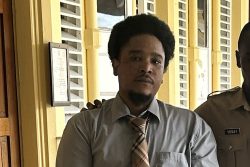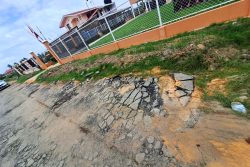These challenges were already apparent when the Duvalier dynasty collapsed in 1986 amidst popular protests and the seizure of power by the military. Given the long history of the Haitian military serving as the defenders of the Haitian elite against the institutionalization of democratic governance, and as an instrument of American influence in Haitian politics, the emergence of military rule in 1986 represented a desperate effort to salvage a discredited political order. Unfortunately, the corruption and the despotism that defined the Duvalier regime had eroded the capacity of the Haitian state to address the wide-ranging threats to the future of the country. The army was the only institution that seemed capable of holding the society together as the regime crumbled. Unfortunately, the Haitian army had no experience in running the state since its main function had been to prevent the emergence of challengers to the Duvaliers. In hindsight, it is evident that the end of the Duvalier dynasty was, in fact, the end of the ancien régime that had emerged out of the American occupation from 1915-34 – an alliance among the Haitian elite, the military, and the American government. The Duvaliers had provided the glue that held the system together – until things fell apart in 1986.
The emergence of the former Catholic priest, Jean Bertrand Aristide, as a voice and symbol of popular discontent propelled him to the Presidency in the elections of 1990. Aristide’s rise from humble circumstances, his intellectual and oratorical gifts, and his pulpit, paved the way for him to be a candidate of change that could lift the Haitian political order out of its existential crisis. Aristide’s campaign and his victory unleashed a search for genuine democracy and representation for the Haitian people, especially for those who had been marginalized under the Duvaliers. However, his victory was not well received by the Haitian elite, the military, and by the Bush administration. The scale of his popular support, his brilliant use of Kréyol to connect with the Haitian population and to mobilize their challenge to the discredited order, and his messianic sensibility which led him to present himself as the agent of Haitian transformation, proved deeply unsettling to the pillars of the ancien régime. In 1991, the military removed him with the collaboration of the Haitian elite and the acquiescence of the Bush administration, and Aristide went into exile first in Venezuela, and later, in the United States.
In the United States, Aristide cultivated allies among progressive factions, in the Haitian-American diaspora, within the Democratic party, and in the Congressional Black Caucus. The Democratic victory in the 1992 election brought Bill Clinton to the White House and opened the way for Aristide’s restoration in 1994 with support from his allies in the US and with a broad array of support from the Organization of American States and the United Nations. However, even as he was able to win support abroad and his return was greeted with a tremendous outpouring of popular support, the Haitian elite seethed, as did his critics, particularly among conservatives and Republicans in the United States. He returned to serve the remainder of his term in office which ended in 1996 and during which he disbanded the Haitian military. Despite this limited effort to move ahead with the objective of restructuring Haitian politics, his influence was limited as he was constitutionally ineligible to run immediately for another term. For Aristide, it seemed that his hope of becoming a transformational figure in Haitian politics was being frustrated.
However, his ally, Rene Preval, was elected President in the 1995 election and Aristide was apparently able to exercise considerable influence behind the scenes. Aristide was re-elected in 2000 and, unfortunately for him, George W. Bush became the President of America in 2001. For Aristide, the winds of American politics had moved in favour of his domestic opponents and that development threatened his own political agenda. Republican and conservative factions in the United States had been deeply offended by his restoration and it became evident that his removal would be a goal of the new Bush administration. While he no longer had to contend with the Haitian military as an institution, it was clear that even Aristide’s popularity would not be enough to prevent a determined effort by his domestic and international opponents to remove him from office as eventually happened in 2004. On this occasion, he was flown to the Central African Republic in an American military aircraft and he is currently living as a guest of the South African government. After the establishment of an interim government, elections in 2006 led to the return of Rene Preval to the Presidency and UN peacekeepers under Brazilian command remain to provide security within Haiti.
This complex process of democratization that has unfolded in Haiti since 1986 has reached a critical stage as the United States military adopted a leading role in the emergency operations required to assist the country in its hour of need. Bill Clinton currently serves as the UN Representative in Haiti charged with devising an economic development program for the country. For the Obama administration in Washington, the issue of Aristide’s role in the future of Haiti and the establishment of a democracy in that country has re-emerged. Aristide’s recent comments about returning to Haiti has added fuel to the fire. It is an issue that will continue to complicate the restive relationship between the United States and other countries in the Americas.
The 2010 earthquake undermined the post-2004 dispensation in Haiti that was imposed by the Bush administration. As the international effort to reconstruct the country moves ahead, like Banquo’s ghost in Shakespeare’s Macbeth, Aristide is a reminder of American unease with Haitian democracy.
(This is one of a series of weekly columns from Guyanese in the diaspora and others with an interest in issues related to Guyana and the Caribbean)









